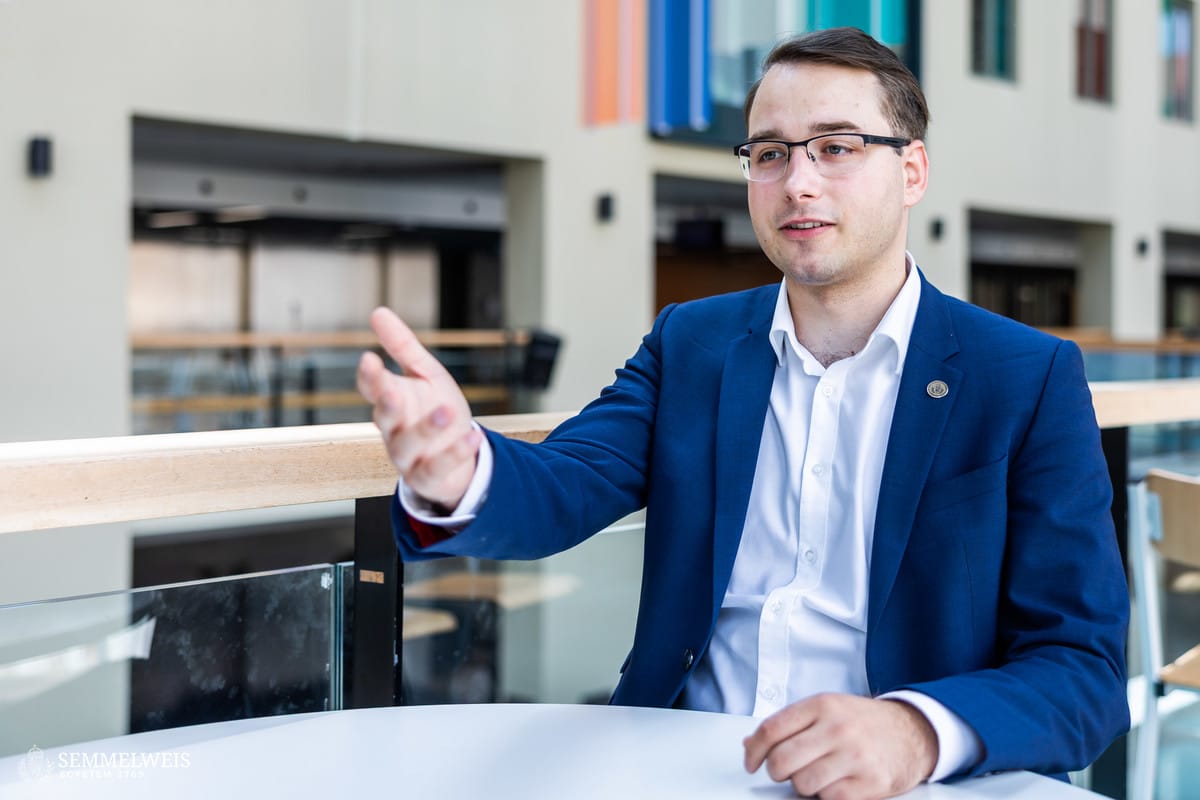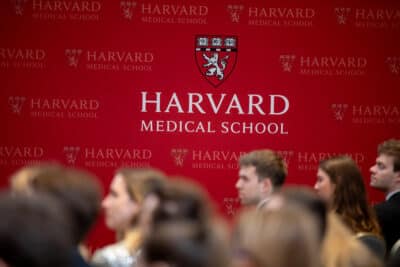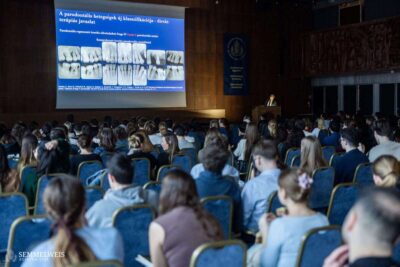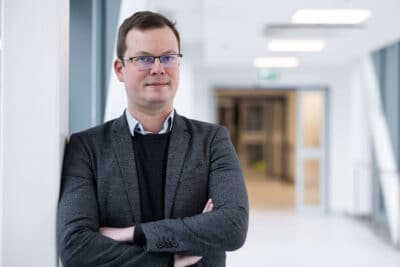The Students’ Union (HÖK) at Semmelweis University must adapt its operations to meet the changing needs and expectations of students, emphasizes Imre Richárd Nagy, who was elected as the new president in July. He is the first pharmacy student in the history of the Students’ Union to hold this position. He adds that the newly admitted Generation Alpha students have completely different needs and expectations; they have other priorities and require new ways of motivating them and capturing their attention. As president, he wants to prepare the organization for these challenges. To this end, since his election, the president, who serves a two-year term, has consulted with university student organizations and senior management, both within and outside HÖK.
Having served as vice president in the previous term, he says he has a good understanding of where the organization’s activities need improvement. The groundwork for reconstituting the operations of the Students’ Union has been laid, as the Delegates’ Assembly has approved the necessary amendments to the statutes. These changes also affect how the HÖK Presidium operates. Following the Senate’s approval, the position of presidential delegate for strategy and finance will be elevated to the level of vice president as of September, while the vice president for internal administration will continue his work as vice president for organization development to address upcoming challenges. In addition, the position of presidential delegate for mentoring programs was created, as the organization intends to pay special attention to improving students’ mental health.
“I gained firsthand insight into students’ problems when I was a member of the Social Welfare Committee. After participating in several mentoring programs as a mentor, both as the institutional coordinator of the Stipendium Hungaricum program and in the Faculty of Pharmacy’s mentoring program, it became even more obvious to me how important it is to pay attention to students’ mental health,” says the president. He believes that special attention should be given to performance deterioration and anxiety caused by various issues that can cast a shadow over student life and, in some cases, lead to deferred studies.
I promote the operation and intend to increase the visibility of mentoring programs to show students that they have options: They can contact mentors, student advisors, and, in the case of more serious problems, they can even seek professional help within the university at the Institute of Behavioral Sciences, the Institute of Mental Health, or the Department of Psychiatry and Psychotherapy.
Imre Richárd Nagy believes that providing mental health support from HÖK will further reduce dropout rates.
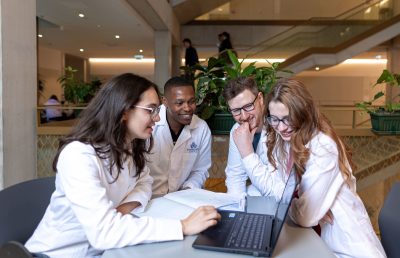 Mentoring programs are not restricted to promoting mental health but also prioritize providing useful information about state and university talent development programs, the Stipendium Hungaricum scholarship, the Diaspora mentoring program, the HÖOK mentoring program for students from socially disadvantaged backgrounds, and the mentoring programs at individual faculties. In these programs, senior students mentor younger students in a structured setting. This has been operating for the longest period and most successfully at the Faculty of Medicine, but it has also been launched at the Faculty of Pharmaceutical Sciences and the András Pető Faculty. In some cases, mentoring is rewarded not only with credits but also with scholarships. The president adds that the Students’ Union considers it important for other faculties to offer such programs and will begin discussions on their implementation and support. Several faculty leaders are in favor of this initiative, so Imre Richárd Nagy is confident that the Students’ Union will be able to actively negotiate with the university administration about the programs.
Mentoring programs are not restricted to promoting mental health but also prioritize providing useful information about state and university talent development programs, the Stipendium Hungaricum scholarship, the Diaspora mentoring program, the HÖOK mentoring program for students from socially disadvantaged backgrounds, and the mentoring programs at individual faculties. In these programs, senior students mentor younger students in a structured setting. This has been operating for the longest period and most successfully at the Faculty of Medicine, but it has also been launched at the Faculty of Pharmaceutical Sciences and the András Pető Faculty. In some cases, mentoring is rewarded not only with credits but also with scholarships. The president adds that the Students’ Union considers it important for other faculties to offer such programs and will begin discussions on their implementation and support. Several faculty leaders are in favor of this initiative, so Imre Richárd Nagy is confident that the Students’ Union will be able to actively negotiate with the university administration about the programs.
He adds that their medium to long-term goal is to cooperate with the National Alliance of Students’ Unions (HÖOK) to increase the amount of student scholarships. In addition, discussions were initiated with the university management regarding opportunities within the institution. As for the latter, he cited the introduction of clinical work this year as a positive example. It attracts an increasing number of medical students by offering financial benefits, the opportunity to earn credit points, and the chance to gain experience.
Due to generational differences, the president also considers ensuring the succession of the Student Union to be a significant challenge, which requires operational and methodological reforms. “In my experience, younger people are much more interested in being members of the community than in being leaders. Therefore, greater attention will need to be paid to recruiting members who have the potential to become leaders,” notes Imre Richárd Nagy. To this end, they will promote the activities of the Students’ Union, social support or performance-based scholarships, and dormitory options at upcoming events such as the Freshers’ Meet, the Summer University, and the Freshman Camp.
Imre Richárd Nagy believes that student representation cannot be successful without commitment, a willingness to help, and humbleness. To achieve this, the Presidium plans to support engaged students by organizing necessary community development training courses and offering personalized skills development. The vice president for organization development will play a significant role in this, adds Imre Richárd Nagy, who also plans to strengthen faculty-specific student representation.
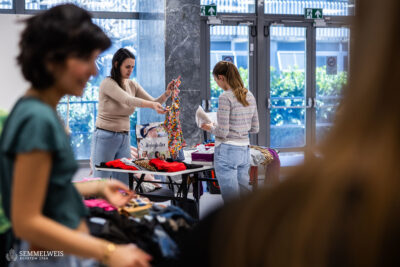 In the long term, the president also intends to expand the Green University Project by incorporating more sustainability initiatives proposed by students. “We are considering holding an idea competition in which students could submit fully developed concepts that they could then implement,” explains Imre Richárd Nagy, recalling last academic year’s pilot project to renew the drinking fountain at the Basic Medical Science Center. In consultation with Dr. Éva Szabó Feketéné, Vice-Rector for Strategy and Development, HÖK plans to install eight to ten similar drinking fountains at major campus sites in the upcoming academic year.
In the long term, the president also intends to expand the Green University Project by incorporating more sustainability initiatives proposed by students. “We are considering holding an idea competition in which students could submit fully developed concepts that they could then implement,” explains Imre Richárd Nagy, recalling last academic year’s pilot project to renew the drinking fountain at the Basic Medical Science Center. In consultation with Dr. Éva Szabó Feketéné, Vice-Rector for Strategy and Development, HÖK plans to install eight to ten similar drinking fountains at major campus sites in the upcoming academic year.
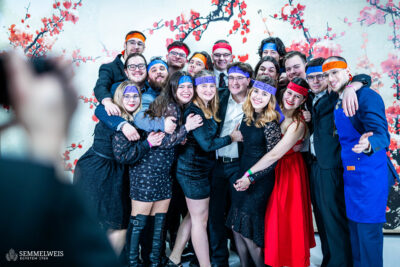 The new president would like to strengthen cooperation with other university student organizations, including international student representations, to promote and revamp the Freshers’ Ball, the Semmelweis Carnival, and the Spring Festival, which offer a true student life experience. He also urges that more faculty councils include international student members. He plans to give the International Students’ Committee a greater role within the organization because he believes it is important to organize joint cultural events that attract Hungarian and international students alike. Additionally, the committee-run Language Club is expected to launch its French course soon.
The new president would like to strengthen cooperation with other university student organizations, including international student representations, to promote and revamp the Freshers’ Ball, the Semmelweis Carnival, and the Spring Festival, which offer a true student life experience. He also urges that more faculty councils include international student members. He plans to give the International Students’ Committee a greater role within the organization because he believes it is important to organize joint cultural events that attract Hungarian and international students alike. Additionally, the committee-run Language Club is expected to launch its French course soon.
Imre Richárd Nagy is confident that, as president, he will be able to make a meaningful contribution to the renewal of the Students’ Union and the representation of students’ interests over the next two years.
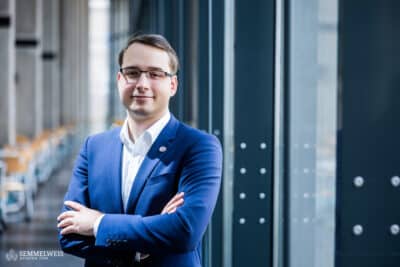 Imre Richárd Nagy is a third-year pharmacy student. He has been actively involved in student representation since his freshman year. He started his career in HÖK’s Student Welfare Committee, a group that has remained close to his heart ever since. He later became a member of the university’s Committee for Students’ Social Affairs and Equal Opportunities. He later became a member of the Delegates’ Assembly and was elected to the Faculty Council. He played a significant role in shaping the current structure of the Green University Project, including designing the “Green University: Together for Our Environment” elective course. He also helped launch Green University Day, which marks the start of Summer University.
Imre Richárd Nagy is a third-year pharmacy student. He has been actively involved in student representation since his freshman year. He started his career in HÖK’s Student Welfare Committee, a group that has remained close to his heart ever since. He later became a member of the university’s Committee for Students’ Social Affairs and Equal Opportunities. He later became a member of the Delegates’ Assembly and was elected to the Faculty Council. He played a significant role in shaping the current structure of the Green University Project, including designing the “Green University: Together for Our Environment” elective course. He also helped launch Green University Day, which marks the start of Summer University.
Melinda Katalin Kiss
Translation: Judit Szabados-Dőtsch
Photos by Bálint Barta; illustration: Bálint Barta, Attila Kovács – Semmelweis University
